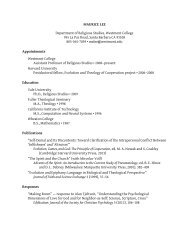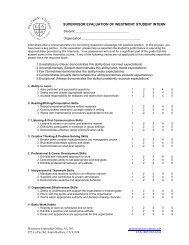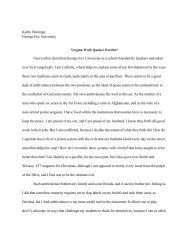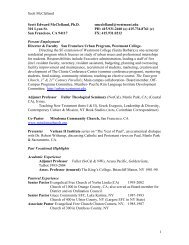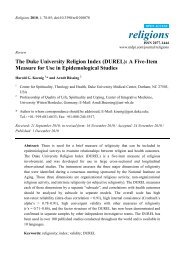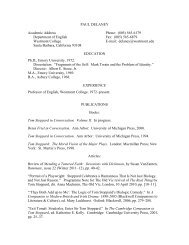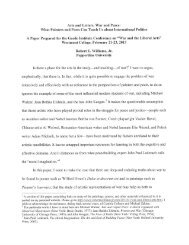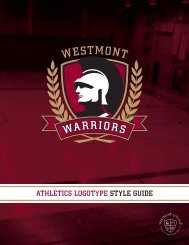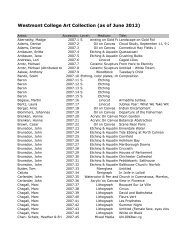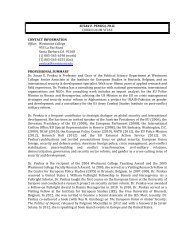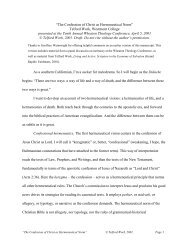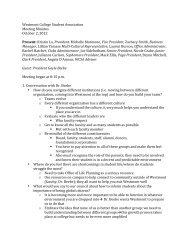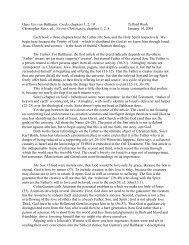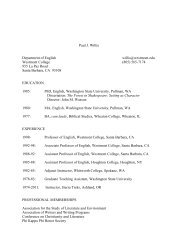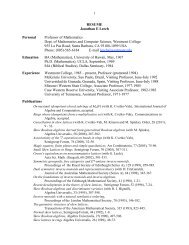Christian Liberal Learning James E. Taylor The history of liberal arts ...
Christian Liberal Learning James E. Taylor The history of liberal arts ...
Christian Liberal Learning James E. Taylor The history of liberal arts ...
Create successful ePaper yourself
Turn your PDF publications into a flip-book with our unique Google optimized e-Paper software.
<strong>Christian</strong> <strong>Liberal</strong> <strong>Learning</strong><br />
<strong>James</strong> E. <strong>Taylor</strong><br />
<strong>The</strong> <strong>history</strong> <strong>of</strong> <strong>liberal</strong> <strong>arts</strong> education is a <strong>history</strong> <strong>of</strong> two competing ideals (Kimball). <strong>The</strong><br />
philosophical ideal can be traced back to the ancient Greek philosopher Socrates. <strong>The</strong> rhetorical<br />
ideal is rooted in the Roman statesman Cicero. In this section, I will characterize these two<br />
conceptions <strong>of</strong> <strong>liberal</strong> education in terms <strong>of</strong> their general nature, purpose and content. <strong>The</strong><br />
philosophical model and the rhetorical model pull in different directions. However, they also<br />
share some common ground. In sketching these two approaches to the <strong>liberal</strong> <strong>arts</strong>, I will be more<br />
concerned with providing possibilities for thinking about the nature <strong>of</strong> <strong>liberal</strong> learning than with<br />
reporting historical facts. As a result, I will portray the two types rather starkly as contrasting<br />
paradigms in a way that may not be completely faithful to their actual origins. Once we have a<br />
general grasp <strong>of</strong> these two traditions, I will recommend a conception <strong>of</strong> <strong>liberal</strong> learning that<br />
maintains the tension between them, affirms what they have in common and provides a home for<br />
the <strong>Christian</strong> faith.<br />
Though rooted in Athens, <strong>liberal</strong> education flowered later in Rome as an outworking <strong>of</strong> the<br />
rhetorical ideal. Under the tutelage <strong>of</strong> Cicero, <strong>liberal</strong> education was aimed at training citizens to<br />
be leaders <strong>of</strong> society. What made the education <strong>liberal</strong> is that it was an education for free<br />
citizens with the leisure to study. What this meant at the time is that the students <strong>of</strong> the <strong>liberal</strong><br />
<strong>arts</strong> were wealthy free men. <strong>The</strong> poor had to work and so did not have the leisure to study.<br />
Slaves were neither citizens nor free for study. Women were not citizens either. Since the<br />
purpose <strong>of</strong> <strong>liberal</strong> education was to train free men to lead society, it was primarily practical. A<br />
good leader is someone who is able to practice good leadership. What makes one capable <strong>of</strong><br />
practicing good leadership is the possession <strong>of</strong> wisdom, moral virtue and eloquence. Thus, in the<br />
rhetorical tradition, a good <strong>liberal</strong> education would involve instruction that would lead to the<br />
possession <strong>of</strong> these personal attributes. Classical texts were used as the basis for the cultivation<br />
<strong>of</strong> these traits. Rhetorical educators assumed these classical works to contain statements <strong>of</strong><br />
important truths, models <strong>of</strong> genuine virtues, and examples <strong>of</strong> eloquent speeches. In this tradition,<br />
the knowledge acquired by <strong>liberal</strong> learning was valuable primarily as an instrument enabling its<br />
possessors to be good leaders in the community. Moreover, the true test <strong>of</strong> the possession <strong>of</strong><br />
genuine wisdom was a person’s ability to communicate it eloquently.<br />
<strong>The</strong> philosophical ideal for <strong>liberal</strong> education is embodied in the Greek philosopher Socrates.<br />
This approach can be best understood by thinking about Socrates’ famous claim that “<strong>The</strong><br />
unexamined life is not worth living.” What Socrates meant by this is that, in order for our lives<br />
to be worthwhile, we must carefully examine our opinions and values to see whether or not they<br />
are really true and good. After critically scrutinizing his own important beliefs and values,<br />
Socrates claimed to be ignorant about what is ultimately true and best. Moreover, he crossexamined<br />
a number <strong>of</strong> his contemporaries who claimed to be wise and good. In doing so, he<br />
used what has become known as the “Socratic Method” <strong>of</strong> critical questioning to show that these<br />
“authorities” were not nearly as wise as they thought they were. Socrates applied his disposition<br />
to question authority to books as well. Books were not repositories <strong>of</strong> truth to be digested but<br />
instead records <strong>of</strong> thinking to be critically engaged. When all was said and done, Socrates<br />
persisted in being skeptical about the possibility <strong>of</strong> knowing the answers to the important<br />
questions he raised. Nonetheless, he believed that if he stopped pursuing the truth about these<br />
things, his life would no longer be worth living.
This emphasis on the perpetual pursuit <strong>of</strong> truth distinguishes the philosophical ideal <strong>of</strong> <strong>liberal</strong><br />
education from the rhetorical model. Socrates contrasted himself with the “sophists” who<br />
claimed to be wise (the Greek word is sophos). Instead, he called himself a lover <strong>of</strong> wisdom (in<br />
Greek philo + sophos). You can love wisdom without being in possession <strong>of</strong> it. If you love it<br />
but don’t have it, you will want to pursue it and try to acquire it. If you are sufficiently skeptical,<br />
your pursuit <strong>of</strong> truth may become perpetual. Though Socrates was primarily interested in<br />
pursuing the truth about matters <strong>of</strong> morality, later philosophers extended the Socratic quest to<br />
include speculation about ultimate reality. Plato and Aristotle believed that pursuing the truth<br />
about such speculative matters (and contemplating it if it is found) was the best way for a human<br />
being to spend time. Thus, the philosophical approach to <strong>liberal</strong> learning came to be<br />
characterized by a perpetual search for the answers to questions about theoretical and speculative<br />
matters. <strong>The</strong>y considered knowledge about these things, if one could ever attain it, to be not only<br />
the best kind <strong>of</strong> knowledge, but also worth having for its own sake whether it had any practical<br />
value or not. For these philosophers, though moral virtues like courage and self-control were<br />
considered important for the sake <strong>of</strong> good citizenship, intellectual virtues like knowledge and<br />
theoretical wisdom were even more important and were necessary for good scholarship.<br />
<strong>The</strong> primary differences between the rhetorical ideal <strong>of</strong> a <strong>liberal</strong> <strong>arts</strong> education and the<br />
philosophical model, as I have characterized them, are summarized in the following table. <strong>The</strong><br />
contrasting phrases should be thought <strong>of</strong> as differences in emphasis:<br />
<strong>The</strong> Rhetorical Ideal <strong>of</strong> <strong>Liberal</strong> <strong>Learning</strong><br />
Emphasizes practical goal <strong>of</strong> good living<br />
Acquisition <strong>of</strong> moral virtues best<br />
Relatively dogmatic<br />
Primarily oriented to community life<br />
Education for good citizenship<br />
Accent on pursuit <strong>of</strong> goodness<br />
More value placed on effective speaking<br />
Knowledge valued as an instrument<br />
Pragmatic political orientation<br />
Emphasis on the possession <strong>of</strong> wisdom<br />
<strong>The</strong> Philosophical Ideal <strong>of</strong> <strong>Liberal</strong> <strong>Learning</strong><br />
Stresses theoretical goal <strong>of</strong> true believing<br />
Acquisition <strong>of</strong> intellectual virtues best<br />
Relatively skeptical<br />
Primarily oriented to individual study<br />
Education for good scholarship<br />
Accent on pursuit <strong>of</strong> truth<br />
More value placed on logical thinking<br />
Knowledge valued for its own sake<br />
Speculative metaphysical orientation<br />
Emphasis on the pursuit <strong>of</strong> wisdom<br />
In spite <strong>of</strong> these differences, these two ideals also share some significant common ground. In<br />
particular, they are both agreed in their rejection <strong>of</strong> (a) educational sophism and (b) educational<br />
utilitarianism. Let’s look at educational sophism first. <strong>The</strong> sophists were described above as<br />
counterp<strong>arts</strong> to Socrates who thought they were wise. Sophists were itinerant teachers in ancient
Greece who <strong>of</strong>fered instruction in things that fostered success. In particular, they taught people<br />
the information and skills they would need to be effective public speakers. <strong>The</strong> art <strong>of</strong> persuasion<br />
could be especially valuable in a democratic society such as Athens. <strong>The</strong> orators and<br />
philosophers were not so much averse to education in the discipline <strong>of</strong> rhetoric (indeed, rhetoric<br />
has pride <strong>of</strong> place among the orators) as much as they were against the sophist’s abuses <strong>of</strong><br />
argumentation. <strong>The</strong> sophistic tendency to pervert the art <strong>of</strong> rhetoric is immortalized in their<br />
boast to be able to teach their students “how to make the weaker argument into the stronger.” 1<br />
<strong>The</strong> problem with this approach, <strong>of</strong> course, is that it makes arguments into instruments <strong>of</strong><br />
manipulation rather than tools for seeking truth. Both the orators and the philosophers oppose<br />
this abuse <strong>of</strong> logic and rhetoric because both groups value truth over merely making something<br />
to pass for true in order to come out ahead.<br />
Educational utilitarianism is the view that an education is worthwhile only if it provides<br />
training in a specialized pr<strong>of</strong>ession or vocation. From the standpoint <strong>of</strong> the educational<br />
utilitarian, both a rhetorical and a philosophical <strong>liberal</strong> <strong>arts</strong> education are too general to be <strong>of</strong><br />
much use. What is needed instead, these utilitarians think, is instruction in the technical methods<br />
<strong>of</strong> a particular occupation. Orators and philosophers are united in their condemnation <strong>of</strong> the<br />
utilitarian approach as overly narrow and restricted. Though the former two groups agree that an<br />
education can and should be useful in some sense, they also think that the best education will<br />
involve the “cultivation <strong>of</strong> humanity” to use Seneca’s phrase (in On Anger). A <strong>liberal</strong> <strong>arts</strong><br />
education, as opposed to special vocational, pr<strong>of</strong>essional or technical training, is general enough<br />
to enhance the life <strong>of</strong> any normal adult human being, regardless <strong>of</strong> his or her particular career.<br />
Another way to put this same point is that a <strong>liberal</strong> education is a humanistic education. It is an<br />
education intended to develop general human capacities.<br />
This characterization <strong>of</strong> <strong>liberal</strong> learning as opposed to vocational training does diverge in one<br />
important respect from the views <strong>of</strong> some philosophers and orators. In saying that a <strong>liberal</strong> <strong>arts</strong><br />
education is meant to pr<strong>of</strong>it any normal adult human being, I have introduced a democratic<br />
element that is not present in every version <strong>of</strong> the philosophical and rhetorical ideals. Early<br />
versions <strong>of</strong> both <strong>of</strong> these models were clearly aristocratic in their orientation. As I said above,<br />
the word ‘<strong>liberal</strong>’ (<strong>liberal</strong>is in Latin) in “<strong>liberal</strong> <strong>arts</strong>” was originally meant to restrict such an<br />
education to people with adequate freedom and leisure to benefit from such an education. Given<br />
the political realities <strong>of</strong> ancient Greece and Rome, this meant that a <strong>liberal</strong> education was for<br />
wealthy male citizens. This, however, seems more due to the accidents <strong>of</strong> the political situation<br />
than to the essence <strong>of</strong> a <strong>liberal</strong> education. A more democratic society, such as our own, provides<br />
a setting in which more people have the resources to enjoy and benefit from <strong>liberal</strong> education.<br />
In sum, though the orators and philosophers disagree in some important ways about the<br />
nature and purpose <strong>of</strong> a <strong>liberal</strong> <strong>arts</strong> education, they agree about two very important things: (1) A<br />
<strong>liberal</strong> education values truth and reason and (2) A <strong>liberal</strong> education is both general and<br />
humane. <strong>The</strong>se two common convictions provide a basis for a conception <strong>of</strong> <strong>liberal</strong> learning that<br />
can accommodate both the rhetorical and philosophical traditions. It can also be integrated with<br />
the <strong>Christian</strong> faith, as we will see in the next section. Let us turn now to consider this inclusive<br />
approach to the <strong>liberal</strong> <strong>arts</strong>.<br />
Any good framework for <strong>liberal</strong> <strong>arts</strong> education will give a general account <strong>of</strong> the nature,<br />
purpose, methods and content <strong>of</strong> such an education. <strong>The</strong> framework I propose makes use <strong>of</strong> the<br />
agreements <strong>of</strong> the orators and philosophers. Consider first the nature <strong>of</strong> <strong>liberal</strong> learning.<br />
1 This quotation is from a fragment <strong>of</strong> the sophist Protagoras’ writings. Another sophist, Gorgias, attempted to<br />
illustrate this principle by concocting an extensive argument for the claim that nothing exists!
Essentially, a <strong>liberal</strong> education is a humane education. That is, it is a course <strong>of</strong> study that<br />
emphasizes the cultivation and perfection <strong>of</strong> certain human abilities and capacities. In Aristotle’s<br />
terms, a <strong>liberal</strong> education is an education that actualizes a certain range <strong>of</strong> human potential.<br />
What range <strong>of</strong> human potential is this That is, what is the scope <strong>of</strong> <strong>liberal</strong> learning Normal<br />
human beings are born with a variety <strong>of</strong> physical and psychological capacities. <strong>The</strong>se capacities<br />
combine to constitute an individual human being’s potential for growth, development,<br />
maturation and education. <strong>The</strong>se inborn potentialities are actualized in human beings as a result<br />
<strong>of</strong> their interactions with their environments over time. Some <strong>of</strong> these changes are relatively<br />
automatic and some require more conscious deliberation. Moreover, some <strong>of</strong> the changes have<br />
more to do with the body and some are more involved with the mind. <strong>Learning</strong> involves changes<br />
to a person’s mind (in addition to whatever changes it brings about in his or her body). Since<br />
learning is a natural process, it can occur without deliberate effort on the part <strong>of</strong> the learner. It<br />
can occur rather passively without the intervention <strong>of</strong> a teacher. However, <strong>liberal</strong> learning<br />
requires a deliberate, disciplined engagement <strong>of</strong> the learner in a program <strong>of</strong> study that is designed<br />
to cultivate human intellectual capacities. Let’s adopt Aristotle’s terminology and call these<br />
cultivated human mental capacities “intellectual virtues”. In sum, then, the nature and scope <strong>of</strong> a<br />
<strong>liberal</strong> <strong>arts</strong> education is the deliberate cultivation and refinement <strong>of</strong> human intellectual virtues.<br />
What is the purpose <strong>of</strong> a <strong>liberal</strong> <strong>arts</strong> education That is, what are the desired results <strong>of</strong> the<br />
cultivation <strong>of</strong> human intellectual virtues In general, intellectual virtues are abilities to use one’s<br />
mind well. So a very general way to state the purpose <strong>of</strong> a <strong>liberal</strong> education is to say that it is an<br />
education that enables you to use your mind well. Can we be more specific You can use your<br />
mind well in a variety <strong>of</strong> ways and for a variety <strong>of</strong> purposes. Following Aristotle, we can<br />
identify three general and important purposes for which we can use our minds well. We can use<br />
our minds (a) to think about what’s true, (b) to live a good life, and (c) to make and enjoy<br />
beautiful and useful things. Our intellectual virtues contribute to our capacity for reflection,<br />
action and creation. I said above that the orators and philosophers agreed about the value <strong>of</strong><br />
truth. That is, both groups assumed that the truth is something that is worth pursuing and also<br />
possessing if possible. Many human intellectual virtues can be characterized in terms <strong>of</strong> the<br />
search for or the possession <strong>of</strong> truth. <strong>The</strong>se include calculating, estimating, hypothesizing,<br />
reasoning, questioning, knowing and remembering. But the orators and philosophers also valued<br />
goodness and beauty. Intellectual virtues that are cultivated for the sake <strong>of</strong> living a good life<br />
include imagining, deliberating, discerning, valuing, planning and deciding. Among those<br />
virtues with beauty in view are perceiving, imagining, inventing, organizing, measuring,<br />
evaluating and designing. So we might say that the purpose <strong>of</strong> a <strong>liberal</strong> <strong>arts</strong> education is to<br />
inculcate all the general intellectual virtues that have truth, goodness and beauty as objectives.<br />
This is on the right track, but it needs to be qualified. <strong>The</strong> kind <strong>of</strong> learning most prominent in a<br />
<strong>liberal</strong> <strong>arts</strong> education is learning that leads to knowledge <strong>of</strong> truths. So the intellectual virtues<br />
aimed at truth are central in the <strong>liberal</strong> <strong>arts</strong>. But this model also accommodates the goals <strong>of</strong><br />
goodness and beauty. Among the truths to be known, if possible, are truths about how to live a<br />
good life and truths about how to make and enjoy beautiful and useful things.<br />
A <strong>liberal</strong> education concerns the acquisition <strong>of</strong> human intellectual virtues primarily for the<br />
pursuit and possible possession <strong>of</strong> truth. What general methods will enable <strong>liberal</strong> learners and<br />
their teachers to attain this end Since the main goal <strong>of</strong> <strong>liberal</strong> learning is knowledge <strong>of</strong> various<br />
truths, and since human beings grasp truths primarily (and perhaps exclusively) by means <strong>of</strong>
language, the methods <strong>of</strong> <strong>liberal</strong> learning will involve various uses <strong>of</strong> language. 2 Chief among<br />
these uses <strong>of</strong> language are reading, writing, speaking and listening. <strong>The</strong>se methods will be<br />
employed in <strong>liberal</strong> learning both in order to understand and in order to know. You can’t know<br />
something to be true unless you first understand what it means. If you are reading or listening,<br />
you won’t be able to understand what someone claims to be true unless he or she expresses it<br />
clearly. Even if you understand a claim someone has said or written, you may not agree with the<br />
person unless he or she argues logically and convincingly for it. Whether you are the one<br />
communicating and arguing or listening and evaluating, you will need to be skilled in language<br />
use, reasoning and convincing.<br />
This brings us to the subject <strong>of</strong> the content <strong>of</strong> <strong>liberal</strong> learning. <strong>The</strong> original three subjects<br />
covered in a <strong>liberal</strong> <strong>arts</strong> education were grammar, logic and rhetoric. <strong>The</strong>se subjects cover the<br />
skills I just mentioned: language use, logical reasoning and effective communication. <strong>The</strong>se<br />
really are at the heart <strong>of</strong> a <strong>liberal</strong> education. Later, the four subjects <strong>of</strong> arithmetic, geometry,<br />
music and astronomy were added. <strong>The</strong>se seven subjects constituted the septem artes <strong>liberal</strong>es.<br />
Today, the typical <strong>liberal</strong> <strong>arts</strong> curriculum includes the humanities (philosophy, <strong>history</strong>, literature<br />
and the creative <strong>arts</strong>), the natural sciences (physics, chemistry and biology), the social sciences<br />
(psychology, sociology, anthropology, political science and economics) and the mathematical<br />
sciences. This may seem like a “grab bag” without a unifying theme. However, all <strong>of</strong> these<br />
disciplines combine to provide the <strong>liberal</strong> learner with the general intellectual skills and<br />
knowledge needed to understand oneself, others, and the world in which we live together.<br />
I have tried to characterize the <strong>liberal</strong> <strong>arts</strong> in such a way as to accommodate both the<br />
rhetorical and the philosophical approaches. Have I succeeded First, I said that the nature <strong>of</strong> a<br />
<strong>liberal</strong> education is to cultivate human intellectual virtues. This may seem to favor the<br />
philosophers. However among the intellectual virtues is practical wisdom, which has as its goal<br />
the living <strong>of</strong> a good and moral life. So this includes the rhetorical emphasis as well as the<br />
philosophical. Second, I held up the pursuit and possible possession <strong>of</strong> truth as the primary goal<br />
<strong>of</strong> <strong>liberal</strong> learning. This allows for both the orators’ relatively dogmatic assumption that we can<br />
possess the truth about practical matters as well as the philosophers’ relatively skeptical claim<br />
that we should rather only pursue the truth about speculative matters. Third, I said the main<br />
methods <strong>of</strong> <strong>liberal</strong> learning are language-oriented. This may diverge from some approaches, but<br />
it is congenial to both the orators and philosophers, who differ only in their different emphases<br />
concerning the uses <strong>of</strong> language. Finally, both orators and philosophers will agree with the<br />
general curriculum I outlined. Again, their differences involve the amount <strong>of</strong> stress to be placed<br />
on some disciplines as opposed to others.<br />
<strong>Christian</strong> <strong>Liberal</strong> <strong>Learning</strong><br />
I have characterized <strong>liberal</strong> learning as learning that is humane, general and primarily<br />
intellectual (aimed primarily at truth on the basis <strong>of</strong> reason). What distinguishes <strong>Christian</strong><br />
<strong>liberal</strong> learning I will identify four ways in which a <strong>Christian</strong> <strong>liberal</strong> <strong>arts</strong> education is<br />
distinctive. In an ideal <strong>Christian</strong> <strong>liberal</strong> <strong>arts</strong> college, the addition <strong>of</strong> <strong>Christian</strong> studies (theology,<br />
biblical studies, church <strong>history</strong>, apologetics, etc.) will serve to (a) complete, (b) ground, (c)<br />
correct and (d) direct <strong>liberal</strong> learning.<br />
2 I will leave open the possibility that some truths are graspable also, or even only, by non-linguistic means. My<br />
claim is only that language is the primary vehicle <strong>of</strong> knowledge <strong>of</strong> truths.
A Complete Education<br />
A <strong>liberal</strong> <strong>arts</strong> education is ideally both general and universal. That is, it should impart the<br />
knowledge and skills needed for human flourishing (general) and also expose students to all the<br />
major domains <strong>of</strong> human knowledge and investigation (universal). Since <strong>Christian</strong> studies<br />
constitute an area <strong>of</strong> human knowledge and investigation, an ideal <strong>liberal</strong> education will be<br />
<strong>Christian</strong>. This is the sense in which <strong>Christian</strong> subjects complete a <strong>liberal</strong> <strong>arts</strong> education.<br />
In <strong>The</strong> Idea <strong>of</strong> a University, the nineteenth century Roman Catholic educator John Henry<br />
Newman argued that every university ought to teach theology (14-32). His argument for this<br />
claim is that (a) a university, by definition, teaches “universal knowledge”. That is, it teaches<br />
every subject that includes truths that can be known. (b) <strong>The</strong>ology is a branch <strong>of</strong> knowledge – it<br />
is a subject that includes knowable truths. <strong>The</strong>refore, (c) a true university will teach theology.<br />
Today, <strong>of</strong> course, virtually all institutions <strong>of</strong> higher learning classified as “universities” exclude<br />
the teaching <strong>of</strong> theology from their academic programs. How should we think about Newman’s<br />
argument in light <strong>of</strong> this educational reality One response is to deny (b), the claim that theology<br />
is a branch <strong>of</strong> knowledge. This would allow a person consistently to claim that an institution can<br />
be a genuine university even if it excludes theology. This is, perhaps, the position <strong>of</strong> most<br />
educators today. Another reply is to deny (a) by defending the view that a university is not<br />
bound by its nature to teach all domains <strong>of</strong> knowledge. A skeptical, postmodern argument for<br />
this position might deny the very possibility <strong>of</strong> knowledge, and even truth. Supporters <strong>of</strong> this<br />
approach could say that a university could be unified around the common interests <strong>of</strong> its<br />
constituents, whatever those interests might be. A final position is to agree with Newman and<br />
conclude that contemporary “universities” are not true universities. Some who take this<br />
viewpoint might agree with George Marsden that it would be desirable for public institutions <strong>of</strong><br />
higher learning to reintroduce the study <strong>of</strong> <strong>Christian</strong> theology in certain carefully circumscribed<br />
ways.<br />
However, whatever conclusion a person comes to about today’s public “universities” in light<br />
<strong>of</strong> Newman’s argument, it seems undeniable that some form <strong>of</strong> his reasoning is inescapable<br />
when applied to <strong>Christian</strong> <strong>liberal</strong> <strong>arts</strong> colleges. Ideally, a <strong>liberal</strong> education will be an education<br />
in all academic areas in which important truths can be discovered. <strong>Christian</strong> theology is such an<br />
area <strong>of</strong> study. So an ideal <strong>liberal</strong> <strong>arts</strong> education will include the study <strong>of</strong> <strong>Christian</strong> theology.<br />
From the standpoint <strong>of</strong> this argument, any <strong>liberal</strong> education that excludes the study <strong>of</strong> <strong>Christian</strong><br />
theology is deficient. Moreover, as Newman points out, by its nature, <strong>Christian</strong> theology has an<br />
especially important role to play relative to the other academic disciplines. A cardinal <strong>Christian</strong><br />
doctrine is that God is the sovereign creator <strong>of</strong> everything that exists other than God.<br />
Consequently, when we study any aspect <strong>of</strong> the universe, we are studying God’s creation. Our<br />
studies provide us with both direct knowledge <strong>of</strong> the created order and indirect knowledge <strong>of</strong><br />
God, the creator <strong>of</strong> this order. Another <strong>Christian</strong> belief is that the key to the redemption and<br />
fulfillment <strong>of</strong> the whole universe is to be found in God. Thus, any discipline in which questions<br />
are raised about value, meaning and purpose will be substantially crippled if <strong>Christian</strong> theology<br />
is not a part <strong>of</strong> the overall academic program that contains that discipline.<br />
A Grounded Education<br />
So the addition <strong>of</strong> <strong>Christian</strong> theology and other <strong>Christian</strong> studies does not merely make the<br />
list <strong>of</strong> <strong>liberal</strong> disciplines longer. <strong>Christian</strong> studies play a special role in <strong>Christian</strong> <strong>liberal</strong> <strong>arts</strong><br />
education. <strong>Christian</strong> <strong>liberal</strong> learning is learning from the standpoint or perspective <strong>of</strong> <strong>Christian</strong><br />
faith. <strong>Christian</strong> <strong>liberal</strong> learners are people who approach every learning situation by asking<br />
“What should (or may) a <strong>Christian</strong> think about this” Your <strong>Christian</strong> convictions provide a
ground or foundation for learning. <strong>The</strong>y are the starting point or basis on which you engage in<br />
the process <strong>of</strong> learning. <strong>The</strong>y are the initial “given” <strong>of</strong> your learning experience. Now it is true<br />
that <strong>Christian</strong>s will continue to learn about their faith as they take up <strong>Christian</strong> studies.<br />
Consequently, one’s <strong>Christian</strong> perspective may be broadened. But what one believes may also<br />
be revised or corrected. <strong>The</strong> <strong>Christian</strong> convictions with which one begins the enterprise <strong>of</strong><br />
<strong>liberal</strong> learning are really a provisional ground. To say that your convictions are a ground is to<br />
say that they are what one assumes to be settled. To say they are provisional is to say that one is<br />
open to the possibility that they are in need <strong>of</strong> amplification or correction. This can be a difficult<br />
balance to strike, but the very idea <strong>of</strong> <strong>Christian</strong> <strong>liberal</strong> learning requires that you find such a<br />
balance.<br />
To say that <strong>Christian</strong> convictions are the provisional ground <strong>of</strong> <strong>Christian</strong> <strong>liberal</strong> learning is<br />
not to say what it is that ought to ground <strong>Christian</strong> convictions themselves. <strong>The</strong> answer to this<br />
question has been the subject <strong>of</strong> much controversy throughout the <strong>history</strong> <strong>of</strong> <strong>Christian</strong> education.<br />
Roughly speaking, there are two main competing positions on this issue. Augustinians hold that<br />
faith is the ultimate ground <strong>of</strong> <strong>Christian</strong> belief. <strong>The</strong>ir motto is “faith seeking understanding.”<br />
<strong>Christian</strong> education, on their view, is a process <strong>of</strong> employing reason to work out the implications<br />
<strong>of</strong> <strong>Christian</strong> faith. Educators in the Thomistic tradition, on the other hand, believe that <strong>Christian</strong><br />
faith ought to be based on reason. In particular, one establishes the existence and main attributes<br />
<strong>of</strong> God on the basis <strong>of</strong> reason. This provides a rational foundation for one’s acceptance <strong>of</strong> the<br />
truths <strong>of</strong> Scripture on the basis <strong>of</strong> faith. <strong>Christian</strong>s continue to be divided on this issue.<br />
However, those who disagree about the ultimate ground <strong>of</strong> <strong>Christian</strong> belief can still agree that<br />
<strong>Christian</strong> convictions, whatever their basis, are the appropriate ground <strong>of</strong> <strong>liberal</strong> learning.<br />
<strong>Christian</strong> Convictions as Correction<br />
Consistency requires that your beliefs be logically compatible. Accordingly, if a claim<br />
conflicts with something you believe to be true about the <strong>Christian</strong> faith, if you are logical, you<br />
will refrain from believing both things. In such a case, you may end up revising your faith<br />
convictions. However, you may also end up rejecting the other claim. How it goes will depend<br />
on the claims in question. For instance, suppose you are watching Carl Sagan’s television series<br />
Cosmos. Dr. Sagan comes on and says, “the cosmos is all there is and all there has ever been and<br />
all there ever will be.” Has Dr. Sagan said something true Well, as a <strong>Christian</strong>, you believe<br />
that God created the universe. You assume that by ‘cosmos’, Dr. Sagan means just ‘universe’.<br />
So if what he says is true, then God has never existed and never will, since God is not the<br />
universe or a part <strong>of</strong> it. Thus, what Dr. Sagan said is inconsistent with a fundamental <strong>Christian</strong><br />
belief. <strong>The</strong>y can’t both be true. In this case, the <strong>Christian</strong> belief is so basic that the only<br />
reasonable course open to you as a <strong>Christian</strong> <strong>liberal</strong> learner is to conclude that Dr. Sagan is<br />
wrong. It is, however, sometimes appropriate in such circumstances to revise your <strong>Christian</strong><br />
convictions instead. For instance, the Catholic Church condemned Galileo on the ground that his<br />
thesis that the Earth moves is inconsistent with Scripture (it conflicts, for instance, with the<br />
literal reading <strong>of</strong> Psalm 104:5: “<strong>The</strong> Lord established the Earth. It shall never be moved.”).<br />
However, scientific investigation eventually confirmed that Galileo was correct. In this case, an<br />
assumption about the <strong>Christian</strong> faith had to be revised.<br />
Why is it appropriate to side with <strong>Christian</strong> convictions in one instance but not in another A<br />
comparison <strong>of</strong> these two examples illustrates one general principle that ought to govern <strong>Christian</strong><br />
thinking in this area. In the first example, Carl Sagan, a scientist, makes a philosophical or<br />
religious claim without any arguments to back it up. <strong>Christian</strong>s can rightfully reject such a claim<br />
as unwarranted and stick to their religious convictions. In the second example, the Church made
a scientific claim on the basis <strong>of</strong> a fallible interpretation <strong>of</strong> the Bible. <strong>The</strong> general lesson to be<br />
drawn here is that scientists should not make unwarranted theological or philosophical claims<br />
and <strong>Christian</strong>s should be careful not to draw scientific conclusions on the basis <strong>of</strong> inadequate<br />
biblical or theological grounds. An important part <strong>of</strong> <strong>Christian</strong> <strong>liberal</strong> learning is the formulation<br />
and justification <strong>of</strong> general methodological principles such as this that ought to govern one’s<br />
thinking about the interplay between <strong>Christian</strong> studies and the other <strong>liberal</strong> disciplines.<br />
<strong>Christian</strong> Convictions as Direction<br />
<strong>The</strong> goal <strong>of</strong> all learning is knowledge. This includes knowing the truth, knowing how to<br />
classify things, and knowing how to perform a variety <strong>of</strong> skills, especially intellectual skills.<br />
Earlier, I said the purpose <strong>of</strong> <strong>liberal</strong> learning is the acquisition <strong>of</strong> all the intellectual virtues that<br />
have truth, goodness and beauty as objectives. Another way to put this is that the goal <strong>of</strong> <strong>liberal</strong><br />
learning is to acquire the ability to use your mind well for the sake <strong>of</strong> knowing the truth,<br />
knowing how to live a good life, and knowing how to make beautiful and useful things. Though<br />
this formulation does provide <strong>liberal</strong> learning with a relatively specific purpose, it also leaves a<br />
number <strong>of</strong> important questions unanswered. Are some truths more important than others are<br />
That is, are some truths more worth knowing than others If so, is there a general way to<br />
distinguish the more valuable from the less valuable truths What makes a life a good one Is<br />
there one general way <strong>of</strong> living that is better than all the others Is it possible to know what kind<br />
<strong>of</strong> life is best Are some things really more beautiful than others are, or is beauty in the eye <strong>of</strong><br />
the beholder For which human purposes is it most worth producing useful things <strong>The</strong>se<br />
questions can be answered adequately only from the standpoint <strong>of</strong> a relatively specific world and<br />
life view that provides answers to perennial questions about reality, knowledge and value. <strong>The</strong><br />
<strong>Christian</strong> faith provides such a perspective. <strong>Christian</strong> theology provides general answers to all <strong>of</strong><br />
these questions (though many specific issues are the subjects <strong>of</strong> debate between <strong>Christian</strong><br />
theologians). For instance, the good life can be defined in terms <strong>of</strong> knowing, loving and serving<br />
God. <strong>The</strong> truths most worth knowing, the actions most worth taking and the things most worth<br />
making will be those truths, actions and things that contribute best to knowing, loving and<br />
serving God. This is the sense in which the <strong>Christian</strong> faith provides direction to <strong>liberal</strong> <strong>arts</strong><br />
education.<br />
In his book <strong>The</strong> <strong>Christian</strong> Mind: How Should a <strong>Christian</strong> Think Harry Blamires says that<br />
the goal <strong>of</strong> <strong>Christian</strong> education is the formation <strong>of</strong> a “<strong>Christian</strong> mind.” Michael Peterson<br />
expands this idea to include the whole person. From his perspective, the total aim <strong>of</strong> <strong>Christian</strong><br />
education is the formation <strong>of</strong> a ‘<strong>Christian</strong> person’. Human persons are, <strong>of</strong> course, more than just<br />
minds. We have he<strong>arts</strong> and bodies as well. We have desires and feelings in addition to thoughts.<br />
We can also act as well as think. Responsible acting on the basis <strong>of</strong> our thoughts, feelings and<br />
desires requires the cultivation <strong>of</strong> moral virtues in addition to intellectual virtues. I stated above<br />
that the goal <strong>of</strong> <strong>liberal</strong> learning is to cultivate the intellectual virtues, that is, those mental habits<br />
that enable you to use your mind well. Does this mean that I side with Blamires’ narrower<br />
conception <strong>of</strong> <strong>Christian</strong> education as opposed to Peterson’s more inclusive version Not<br />
necessarily. <strong>The</strong>re is a way to construe their views so as to make them compatible.<br />
This harmonization requires us to make a distinction between three kinds <strong>of</strong> goals: proximate<br />
goals, ultimate goals and intermediate goals. A proximate goal <strong>of</strong> a given activity is a goal one<br />
aims at first in undertaking that endeavor. It is the immediate goal <strong>of</strong> one’s efforts. One can<br />
strive to achieve a proximate goal as a means to the attainment <strong>of</strong> other goals. If one <strong>of</strong> these<br />
other goals is a result one seeks to bring about for its own sake rather than for the sake <strong>of</strong> some<br />
further goal, it is an ultimate goal. Any goals one has that are neither proximate nor ultimate are
intermediate goals. Proximate goals are <strong>of</strong>ten pursued for the sake <strong>of</strong> an intermediate goal or<br />
goals and intermediate goals are desired for the sake <strong>of</strong> fulfilling an ultimate goal. An example<br />
will make these distinctions clear. Sam takes up a career in order to make money. Making<br />
money is Sam’s proximate goal. <strong>The</strong> reason Sam wants to make money is so that he can be<br />
financially secure. This is an intermediate goal for Sam rather than an ultimate goal, since the<br />
reason he wants to be financially secure is so that he can be happy. Since Sam wants happiness<br />
only for its own sake, being happy is his ultimate goal.<br />
We can now use these three kinds <strong>of</strong> goals to explain a way consistently to combine<br />
Blamires’ conception <strong>of</strong> <strong>Christian</strong> education with Peterson’s. <strong>Christian</strong> <strong>liberal</strong> learning is a goaloriented<br />
activity. Ideally, students engage in <strong>liberal</strong> learning in order to actualize their<br />
intellectual potential. When this <strong>liberal</strong> learning is <strong>Christian</strong>, this involves learning to improve<br />
one’s ability to “think <strong>Christian</strong>ly” as Blamires puts it. However, this need not be the only goal<br />
<strong>of</strong> a <strong>Christian</strong> <strong>liberal</strong> <strong>arts</strong> education. An important intermediate goal <strong>of</strong> such an education is fully<br />
to become the kind <strong>of</strong> person that God made human beings to be. Intellectual virtue is at least a<br />
very important part <strong>of</strong> the means to this end. This is especially evident with respect to the<br />
various intellectual virtues that fall under the heading <strong>of</strong> “wisdom”. Surely God intends for us to<br />
become both wise and good – both intellectual competence and morally good character are<br />
components <strong>of</strong> true godliness or “God-likeness”. After all, God is both maximally intellectually<br />
able and supremely morally good. So <strong>liberal</strong> learning is both for the sake <strong>of</strong> mental growth (the<br />
proximate goal) and the growth <strong>of</strong> the whole person (the intermediate goal). This accommodates<br />
Peterson’s position. But there is more (as I’m sure both Blamires and Peterson would agree).<br />
Becoming a <strong>Christian</strong> person may be valuable in itself, but it is also a means to another goal that<br />
is good only in itself. This is the goal <strong>of</strong> knowing, loving and serving God. This is the ultimate<br />
ideal goal <strong>of</strong> all <strong>of</strong> human life and <strong>of</strong> each part <strong>of</strong> human life. <strong>The</strong>refore, it is the ultimate goal <strong>of</strong><br />
the human activity <strong>of</strong> <strong>Christian</strong> <strong>liberal</strong> learning. So <strong>Christian</strong> <strong>liberal</strong> learning has three important<br />
goals: Its proximate goal is to improve a person’s mind; its intermediate goal is to contribute to<br />
the cultivation <strong>of</strong> <strong>Christian</strong> personhood; and its ultimate goal is to enable people to know, love<br />
and serve God.<br />
This account <strong>of</strong> the goals <strong>of</strong> <strong>Christian</strong> <strong>liberal</strong> learning provides a framework within which to<br />
accommodate both the rhetorical and the philosophical ideals discussed in the previous section.<br />
Recall that the rhetorical ideal emphasizes the acquisition <strong>of</strong> the moral virtues for the sake <strong>of</strong><br />
good living and good citizenship in the form <strong>of</strong> political involvement and contribution to the<br />
community. On this view, knowledge is good primarily as an instrument for these purposes and<br />
effective speaking is the highest art. <strong>The</strong> philosophical view stresses the cultivation <strong>of</strong> the<br />
intellectual virtues for the sake <strong>of</strong> true believing and good scholarship focused on metaphysical<br />
and scientific investigation. On this view, knowledge is good primarily for its own sake and<br />
logical thinking is the highest art. <strong>The</strong>se two ideals are <strong>of</strong>ten in tension with each other, since<br />
their advocates tend to tout the values embodied in them as higher than those composing the<br />
other ideal. However, it is not necessary for these two visions for <strong>liberal</strong> <strong>arts</strong> education to be<br />
mutually exclusive. <strong>Liberal</strong> learning can improve students’ minds by making them wise.<br />
Wisdom is a kind <strong>of</strong> knowledge that comprises an important part <strong>of</strong> the proximate goal <strong>of</strong> a<br />
<strong>liberal</strong> education. Both rhetoricians and philosophers applaud it. This is because wisdom comes<br />
in a variety <strong>of</strong> forms. In general, wisdom is knowledge <strong>of</strong> important truths. Valuable truths<br />
include those that explain the nature <strong>of</strong> reality and the meaning <strong>of</strong> human life, those that enable<br />
their possessors to live well, and those that provide a basis for making beautiful and useful<br />
things. A <strong>liberal</strong> <strong>arts</strong> education can instill wisdom <strong>of</strong> all these kinds. Though they stress
different kinds <strong>of</strong> wisdom, rhetoricians and philosophers can agree that wisdom in general is a<br />
very good thing. Moreover, though these groups may highlight different aspects <strong>of</strong> the<br />
intermediate goal <strong>of</strong> a good life for human beings, they can both agree that wisdom is a very<br />
important component <strong>of</strong> such a life. Finally, if they are <strong>Christian</strong>s, they can find much common<br />
ground in the commitment to the ultimate goal <strong>of</strong> knowing, loving, and serving God.<br />
<strong>The</strong>se common commitments can coexist peacefully with ongoing disagreements <strong>of</strong> a more<br />
specific sort that emerge out <strong>of</strong> the competing ideals <strong>of</strong> <strong>liberal</strong> learning. This continuing tension<br />
can be a good thing. Both the rhetorical ideal and the philosophical ideal are prone to lapsing<br />
into degenerate forms. <strong>The</strong> rhetorical ideal, with its focus on practicality, can tend to become<br />
overly fixated on technology and technique at the expense <strong>of</strong> substance and content. It can also<br />
tend to become overly pragmatic, anti-intellectual and anti-theoretical. <strong>The</strong> philosophical ideal,<br />
which stresses theory, can be disposed to become excessively pedantic, academic, and “ivory<br />
tower”. It may become impractical, irrelevant, and removed from important human concerns. A<br />
healthy <strong>Christian</strong> <strong>liberal</strong> <strong>arts</strong> college will honor both <strong>of</strong> these ideals so that, in struggling to hold<br />
them together, these inadequate forms <strong>of</strong> each will be avoided. Perhaps the best way to do this is<br />
to make wisdom <strong>of</strong> all kinds (theoretical, practical, productive, etc.) the primary proximate goal<br />
<strong>of</strong> a <strong>liberal</strong> education.
Works Cited<br />
Blamires, Harry. <strong>The</strong> <strong>Christian</strong> Mind: How Should a <strong>Christian</strong> Think London: S.P.C.K., 1963.<br />
Kimball, Bruce A. Orators & Philosophers: A History <strong>of</strong> the Idea <strong>of</strong> <strong>Liberal</strong> Education.<br />
expanded edition New York: College Entrance Examination Board, 1995.<br />
Marsden, George. <strong>The</strong> Soul <strong>of</strong> the American University: From Protestant Establishment to<br />
Established Nonbelief. New York: Oxford University Press, 1996.<br />
Newman, John Henry. “<strong>The</strong>ology a Branch <strong>of</strong> Knowledge.” Discourse II. New York: Holt,<br />
Rinehart and Winston, 1960: 14-32.<br />
Peterson, Michael. Philosophy <strong>of</strong> Education: Issues and Options. Downer’s Grove, IL:<br />
InterVarsity Press, 1986.



